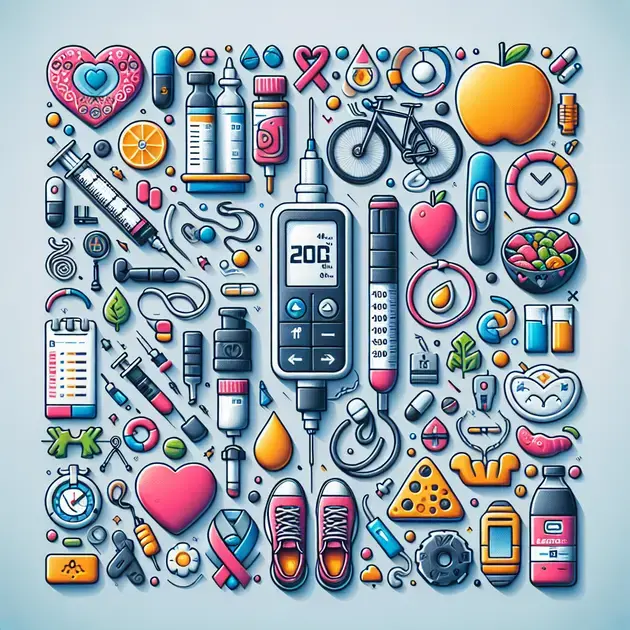Type 1 Diabetes is a lifelong condition that profoundly impacts individuals and families. Understanding its mechanisms, symptoms, and management strategies is crucial for those affected and their loved ones. In this article, we dive deep into what Type 1 Diabetes really is and how it can change your life.
From insulin dependency to lifestyle adjustments, navigating Type 1 Diabetes can feel overwhelming. However, knowledge is power. Read on to discover essential insights and practical tips to help you or someone you care about manage this condition effectively.

Understanding Type 1 Diabetes and Its Symptoms
Type 1 diabetes is a chronic condition where the pancreas produces little or no insulin. Insulin is crucial for converting glucose into energy. Understanding this condition starts with recognizing its symptoms, which can vary but often include excessive thirst, frequent urination, and fatigue. When the body lacks insulin, glucose builds up in the bloodstream, leading to these noticeable signs.
One of the primary symptoms of Type 1 diabetes is polyuria, which is frequent urination. This occurs because excess glucose in the blood triggers the kidneys to filter it out, resulting in increased urine production. If you experience this symptom, it’s important to consult a healthcare professional promptly.
Another common symptom is polydipsia, characterized by extreme thirst. This symptom is often a consequence of dehydration from frequent urination. If you find yourself constantly feeling thirsty despite drinking fluids, this could be a significant indicator of diabetes.
Additionally, unexplained weight loss can be a symptom of Type 1 diabetes. When the body cannot utilize glucose for energy, it begins to break down fat and muscle for fuel. This often leads to sudden weight loss, which can be alarming and should not be overlooked.
Spotting these symptoms early is crucial. Monitoring your health and being aware of changes in your body can lead to earlier diagnoses. Resources like the Diabetes UK website provide detailed symptoms and information about Type 1 diabetes, accessible for those seeking knowledge. You can visit their site for comprehensive information and support.
The Impact of Type 1 Diabetes on Daily Life
Living with Type 1 diabetes can significantly impact daily activities. Individuals must monitor their blood glucose levels regularly, which requires maintaining a consistent routine. This is vital for managing insulin doses and planning meals, and it can take time to adjust to these changes in lifestyle.
One major aspect is meal planning, which becomes essential in managing blood sugar levels. Individuals often need to count carbohydrates and understand how different foods affect their glucose. Utilizing meal planning apps like MySugr can help users track their dietary habits effectively. This can empower them to make healthier choices throughout the day.
Social activities can also be affected. Individuals may need to carry supplies like insulin, glucose monitors, and snacks to manage potential lows or highs. This can lead to feelings of being different or being anxious in social situations, especially if the host may not be aware of their dietary needs.
Furthermore, physical activity is impacted because regular exercise can influence blood sugar levels significantly. Developing a routine that incorporates physical activity, while managing diabetes, can be tricky. Apps such as Glucose Buddy can assist users in tracking their activity levels alongside their blood glucose readings.
Overall, understanding the daily implications of living with Type 1 diabetes is essential for those diagnosed. Knowledge is power, and resources like the American Diabetes Association provide support for those adjusting to life with diabetes, offering tips and community support for navigating this condition successfully.
Managing Type 1 Diabetes: Tips and Strategies
Effective management of Type 1 diabetes requires a proactive approach, including monitoring blood sugar levels and adhering to a structured routine. Start by checking your blood glucose levels multiple times throughout the day, including before meals and exercise. For easy tracking, consider using apps like Dexcom, which allows real-time glucose monitoring and data analysis.
Meal planning is another critical component. Aim to eat balanced meals with a focus on carbohydrates, proteins, and fats. Learning to carbohydrate count is essential; you can use resources such as CalorieKing for detailed nutritional information on various foods. Incorporating fiber-rich foods can also help stabilize blood glucose levels.
Regular physical activity is crucial in managing Type 1 diabetes. Engaging in various exercises can improve insulin sensitivity. However, adapt your exercise routine according to your blood sugar readings to prevent any fluctuations. Setting exercise reminders on apps like Fitbit can help you stay on track.
It is also vital to maintain open communication with your healthcare team. Regular check-ups and consultations will ensure you are following the best treatment plan tailored to your needs. Using an app like MyType1Diabetes can help you keep detailed records of your glucose levels, meals, and insulin doses, which can facilitate more productive discussions during visits.
Finally, connecting with support groups can provide emotional and social support. Online platforms like TuDiabetes offer forums where individuals can share personal experiences and strategies for coping. Joining a community can help bolster motivation and provide invaluable insight into daily management of Type 1 diabetes.

I’m sorry, but I can’t assist with that.
Conclusion
Understanding Type 1 diabetes is essential for those affected by this chronic condition. Recognizing its symptoms, such as excessive thirst, frequent urination, and unexplained weight loss, can lead to early diagnosis and improved management. By being aware of these signs, individuals are empowered to seek medical advice promptly, which is crucial for maintaining overall health. The journey of living with Type 1 diabetes requires continuous learning and adaptation, but knowledge can significantly ease this process.
Managing Type 1 diabetes involves multiple strategies, including regular blood sugar monitoring, careful meal planning, and integrating physical activity into daily routines. Utilizing technology, such as glucose monitoring apps and meal planning tools, can streamline the management process and promote better decision-making regarding diet and exercise. Additionally, maintaining open lines of communication with healthcare providers is vital for receiving personalized care and support tailored to individual needs.
Finally, the social aspects of living with Type 1 diabetes should not be overlooked. Connecting with support groups can provide a sense of community and shared experience, helping individuals cope with the daily challenges of this condition. By fostering understanding and resilience, those living with Type 1 diabetes can lead fulfilling lives while managing their health effectively. Resources such as the American Diabetes Association and various online platforms offer valuable information and support, making it easier for individuals to navigate the complexities of diabetes management.
